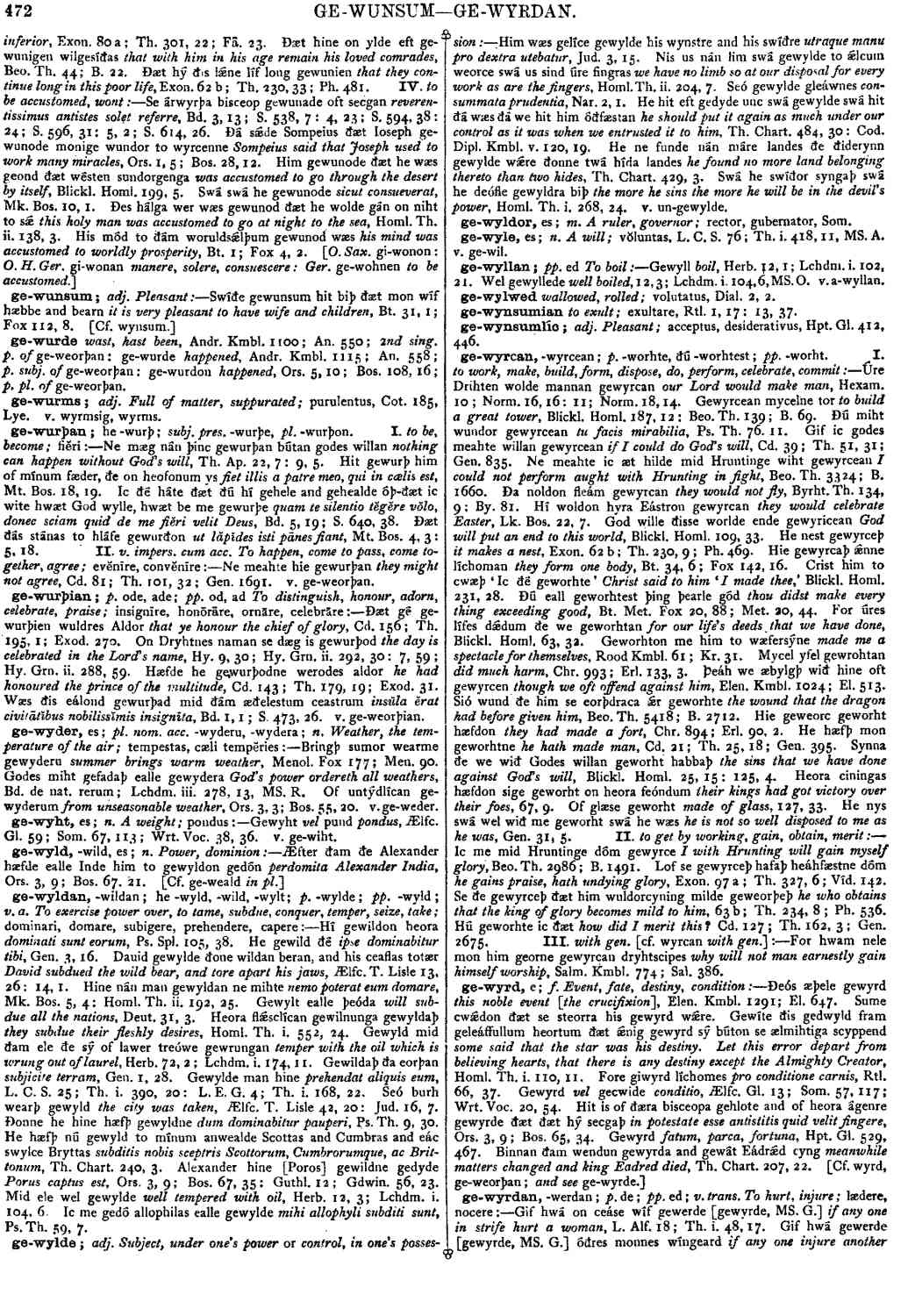ge-wyrcan
- verb [ weak ]
-
Úre Drihten wolde mannan gewyrcan
our Lord would make man,
- Hexam. 10 ;
- Norm. 16, 16 :
- 11 ;
- Norm. 18,14 .
-
Gewyrcean mycelne tor
to build a great tower,
- Blickl. Homl. 187, 12 :
- Beo. Th. 139 ;
- B. 69 .
-
Ðú miht wundor gewyrcean
tu facis mirabilia,
- Ps. Th. 76. 11 .
-
Gif ic godes meahte willan gewyrcean
if I could do God's will,
- Cd. 39 ;
- Th. 51, 31 ;
- Gen. 835 .
-
Ne meahte ic æt hilde mid Hruntinge wiht gewyrcean
I could not perform aught with Hrunting in fight,
- Beo. Th. 3324 ;
- B. 1660 .
-
Ða noldon fleám gewyrcan
they would not fly,
- Byrht. Th. 134, 9 ;
- By. 81 .
-
Hí woldon hyra Eástron gewyrcan
they would celebrate Easter,
- Lk. Bos. 22, 7 .
-
God wille ðisse worlde ende gewyricean
God will put an end to this world,
- Blickl. Homl. 109, 33 .
-
He nest gewyrceþ
it makes a nest,
- Exon. 62 b ;
- Th. 230, 9 ;
- Ph. 469 .
-
Hie gewyrcaþ ǽnne líchoman
they form one body,
- Bt. 34, 6 ;
- Fox 142, 16 .
-
Crist him to cwæþ 'Ic ðé geworhte'
Christ said to him 'I made thee,'
- Blickl. Homl. 231, 28 .
-
Ðú eall geworhtest þing þearle gód
thou didst make every thing exceeding good,
- Bt. Met. Fox 20, 88 ;
- Met. 20, 44 .
-
For úres lífes dǽdum ðe we geworhtan
for our life's deeds that we have done,
- Blickl. Homl. 63, 32 .
-
Geworhton me him to wæfersýne
made me a spectacle for themselves,
Rood- Kmbl. 61; Kr. 31 .
-
Mycel yfel gewrohtan
did much harm,
- Chr. 993 ;
- Erl. 133, 3 .
-
Þeáh we æbylgþ wið hine oft gewyrcen
though we oft offend against him,
- Elen. Krnbl. 1024 ;
- El. 513 .
-
Sió wund ðe him se eorþdraca ǽr geworhte
the wound that the dragon had before given him,
- Beo. Th. 5418 ;
- B. 2712 .
-
Hie geweorc geworht hæfdon
they had made a fort,
- Chr. 894 ;
- Erl. 90, 2 .
-
He hæfþ mon geworhtne
he hath made man,
- Cd. 21 ;
- Th. 25, 18 ;
- Gen. 395 .
-
Synna ðe we wið Godes willan geworht habbaþ
the sins that we have done against God's will,
- Blickl. Homl. 25, 15 :
- 125, 4 .
-
Heora ciningas hæfdon sige geworht on heora feóndum
their kings had got victory over their foes,
- 67, 9 .
-
Of glæse geworht
made of glass,
- 127, 33 .
-
He nys swá wel wið rite geworht swá he wæs
he is not so well disposed to me as he was,
- Gen. 31, 5 .
-
Ic me mid Hruntinge dóm gewyrce
I with Hrunting will gain myself glory,
- Beo. Th. 2986; B. 1491.
-
Lof se gewyrceþ hafaþ heáhfæstne dóm
he gains praise, hath undying glory,
- Exon. 97 a ;
- Th. 327, 6 ;
- Víd. 142 .
-
Se ðe gewyrceþ ðæt him wuldorcyning milde geweorþeþ
he who obtains that the king of glory becomes mild to him,
- 63 b ;
- Th. 234, 8 ;
- Ph. 536 .
-
Hú geworhte ic ðæt
how did I merit this?
- Cd. 127 ;
- Th. 162, 3 ;
- Gen. 2675 .
-
For hwam nele mon him georne gewyrcan dryhtscipes
why will not man earnestly gain himself worship,
- Salm. Kmbl. 774 ;
- Sal. 386 .
Bosworth, Joseph. “ge-wyrcan.” In An Anglo-Saxon Dictionary Online, edited by Thomas Northcote Toller, Christ Sean, and Ondřej Tichy. Prague: Faculty of Arts, Charles University, 2014. https://bosworthtoller.com/16939.
Checked: 1